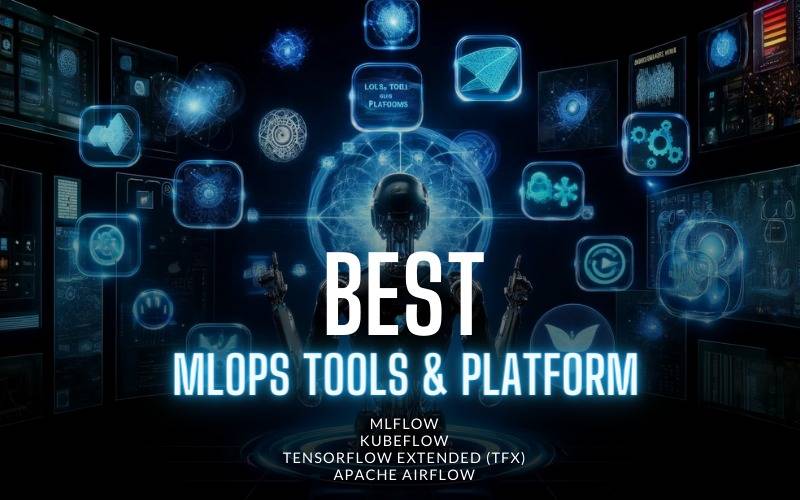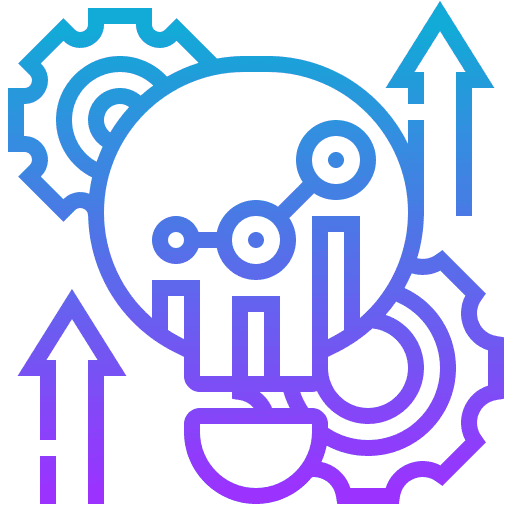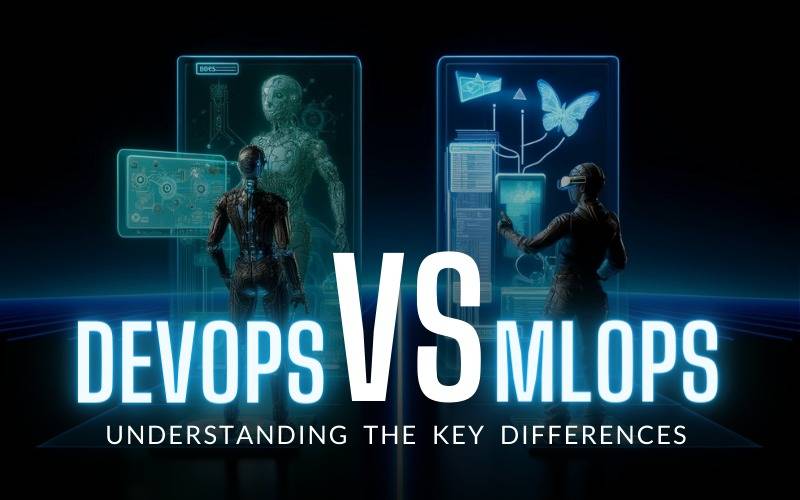MLOps vs DevOps: Understanding the Key Differences
Have you ever wondered how tech companies manage to release new updates so quickly and without issues? This is where the roles of MLOps and DevOps come into play. But what exactly are MLOps vs DevOps? We’re diving deep into these methodologies to uncover how they redefine efficiency and effectiveness in technology teams across the globe.
Understanding MLOps vs DevOps is crucial, whether you’re a tech professional or just interested in how digital products are created and managed. This guide will help you understand each approach, highlighting their roles in enhancing the speed and usability of modern software and machine learning applications. Knowing these methods is key to appreciating the behind-the-scenes efforts that ensure our digital experiences are not only fast but also smooth and reliable.
What Are MLOps Vs DevOps Really About?
MLOps and DevOps are methodologies designed to streamline and optimize the processes behind software development and deployment. DevOps integrates development and operations teams to improve collaboration and speed up the delivery of software updates with practices like continuous integration and continuous deployment. MLOps applies a similar philosophy to machine learning projects, focusing on automating the machine learning lifecycle from data collection and model training to deployment and management. Both aim to increase efficiency, reduce errors, and enhance the quality of applications in continuous cycles of improvement.
MLOps Principles
MLOps principles are centered around automating and streamlining the machine learning lifecycle. This includes everything from data preparation and model training to deployment and monitoring, with an emphasis on collaboration and communication across teams.
Why MLOps?
MLOps is crucial because it addresses the complexities of deploying and maintaining machine learning models in production. It ensures that models are not only accurate and performant when developed, but also remain so as they scale and as data evolves over time.
How MLOps Works?
MLOps works by integrating machine learning models into the broader IT infrastructure, enabling continuous delivery and management of these models. This process typically involves version control, continuous integration, testing, deployment, and monitoring, all supported by automated workflows.
Advantages Of MLOps
The advantages of MLOps include improved deployment speed, higher model quality, better collaboration among teams, more efficient resource management, and enhanced scalability and reliability of machine learning models in production.

Best MLOps Tools & Platform
Some of the best MLOps tools and platforms include:
MLflow
Manages the machine learning lifecycle, including experimentation, reproducibility, and deployment.
Kubeflow
Makes it easy to deploy machine learning workflows on Kubernetes.
TensorFlow Extended (TFX)
An end-to-end platform designed to manage production machine learning pipelines.
Apache Airflow
Helps automate the setup, scheduling, and monitoring of complex computational workflows.
DevOps Principles
DevOps principles focus on continuous integration, continuous delivery, and strong collaboration between development and operations teams. These principles aim to shorten the development lifecycle, increase deployment frequency, and create a more agile application development and maintenance process.
What is DevOps?
DevOps is a set of practices that combines software development (Dev) and IT operations (Ops). It aims to shorten the systems development life cycle and provide continuous delivery with high software quality. DevOps is also about automating and integrating the processes between software development and IT teams to help them build, test, and release software faster and more reliably.
Why DevOps?
DevOps is essential because it enhances a company’s ability to deliver applications and services at a high velocity: evolving and improving products faster than organizations using traditional software development and infrastructure management processes. This speed enables organizations to better serve their customers and compete more effectively in the market.
How DevOps Works?
DevOps works by removing the silos between the traditionally separate developer and operations teams. By fostering a culture of collaboration, the development and operations teams work together, share many responsibilities, and combine their workflows. This integration supports a range of improved outcomes including reduced time to market, lower failure rate of new releases, shortened lead time between fixes, and faster mean time to recovery in the event of a new release crashing or otherwise disabling the current system.
Advantages Of DevOps
Advantages of DevOps include faster development and deployment of updates, improved problem-solving and collaboration, increased efficiencies through automation, enhanced stability of operating environments, and better use of resources.

Best DevOps Framework, Tools and Platforms
Popular DevOps tools and frameworks include:
Jenkins
An open-source automation server that enables developers around the world to reliably build, test, and deploy their software.
Docker
A platform and tool for building, distributing, and running Docker containers.
Ansible
An open-source automation tool for configuration management, application deployment, task automation and also IT orchestration.
Kubernetes
An open-source system for automating deployment, scaling, and management of containerized applications.
Git
A distributed version control system to track changes in source code during software development.
Similarities between MLOps and DevOps
MLOps and DevOps share several foundational principles and methodologies that enhance their effectiveness across software and machine learning operations. Here’s a clearer breakdown of their key similarities:
Automation:
DevOps: Focuses on automating the software deployment cycle from integration to delivery.
MLOps: Automates the machine learning lifecycle, including data handling, model training, and deployment.
Continuous Improvement:
Both Practices: Employ continuous integration and continuous deployment (CI/CD) to enable ongoing development, frequent testing, and reliable deployment, helping teams to identify and rectify issues swiftly.
Collaboration and Communication:
DevOps: Promotes synergy between development and operations teams.
MLOps: Bridges gaps between data scientists, ML engineers, and IT professionals, facilitating a unified approach to project handling.
Monitoring and Feedback:
DevOps: Monitoring is crucial for maintaining system health and performance.
MLOps: Focuses on monitoring model performance to ensure accuracy and reliability continue post-deployment.
Focus on Quality and Efficiency:
Both Practices: Aim to deploy their outputs—whether software or machine learning models—with high efficiency and minimal errors.
Differences between MLOps and DevOps
While MLOps and DevOps share foundational principles, they also have distinct differences that tailor each to specific types of projects and goals. Here’s a breakdown of the key differences:
Primary Focus:
DevOps: Aims to unify software development (Dev) and software operation (Ops). The main focus is on the continuous delivery of software updates to improve application deployment and infrastructure management.
MLOps: Focuses specifically on the lifecycle of machine learning models, from development through deployment and maintenance. Its main goal is to improve the creation, deployment, and operation of machine learning models.
Core Components:
DevOps: Involves practices like continuous integration and continuous deployment of software, infrastructure as code, and automated testing.
MLOps: Deals with data version control, model training, model validation, model serving, and monitoring model performance over time.
Implementation Challenges:
DevOps: Challenges often include cultural shifts within organizations, integration of new tools with existing systems, and training teams to adopt new workflows.
MLOps: Faces challenges such as managing data drift, updating models with new data, ensuring model fairness, and handling the complexity of deploying models in diverse environments.
Tools and Technologies:
DevOps: Utilizes tools such as Jenkins for automation, Docker for containerization, and Kubernetes for orchestration.
MLOps: Leverages tools like MLflow for lifecycle management, TensorFlow Extended for end-to-end platform management, and Kubeflow for orchestrating workflows on Kubernetes.
Outcome Measurement:
DevOps: Success is typically measured by the frequency and reliability of software updates and new releases.
MLOps: Success is measured by the accuracy and predictive performance of machine learning models in production environments.
The Comparison: MLOps vs DevOps
Functionality |
MLOps |
DevOps |
Version Control |
Manages data sets, machine learning models, and associated experiments. | Automates the software development lifecycle including testing, integration, and deployment processes. |
Collaboration Tools |
Facilitates collaboration between data scientists, machine learning engineers, and IT operations. | Enhances cooperation between software developers, QA engineers, and IT operations. |
Monitoring & Feedback |
Continuous monitoring of model performance and automated retraining based on performance drift. | Continuous monitoring of application performance and system health, often using real-time feedback to optimize operations. |
Version Control |
Manages data sets, machine learning models, and associated experiments. | Manages application code and configuration settings, ensuring consistency across environments. |
Deployment Practices |
Emphasizes seamless model deployment into production environments, often using containers and microservices. | Focuses on rapid and reliable software deployment practices such as CI/CD pipelines and container orchestration. |
Tools and Integrations |
Commonly uses tools like MLflow, TensorFlow Extended, and Kubeflow for managing machine learning workflows. | Utilizes tools such as Jenkins, Docker, Kubernetes, and Ansible for automation and orchestration. |
Integrating MLOps with DevOps Practices
Integrating MLOps with DevOps streamlines the development and management of both software and machine learning models. This unified approach leverages common CI/CD pipelines, enhancing automation and operational efficiency. Tools like Kubernetes for orchestration and Jenkins for automation ensure consistent updates across applications and models, improving deployment speed and system reliability.

Strategies for Effective MLOps and DevOps Adoption
Adopting MLOps and DevOps practices effectively involves several strategic approaches that can facilitate smoother transitions and better integration within organizations:
Cultural Change
Foster a culture that values collaboration across all teams involved, from developers and operations to data scientists. This cultural shift is essential for breaking down silos and promoting open communication and shared responsibilities.
Training and Development
Invest in training for your teams to ensure they have the necessary skills to implement and manage DevOps and MLOps workflows. This includes understanding new tools, technologies, and practices that are fundamental to both disciplines.
Tool Integration
Select and integrate tools that complement both MLOps and DevOps practices. Look for solutions that offer scalability, ease of use, and compatibility with existing systems. Tools like Jenkins, Docker, and Kubernetes are commonly used in DevOps, while MLOps might require additional tools like MLflow or Kubeflow.
Automation
Automate as much of the development, testing, deployment, and monitoring processes as possible. Automation not only speeds up workflows but also reduces the likelihood of errors, making the processes more efficient and reliable.
Continuous Monitoring and Testing
Implement continuous monitoring and testing to quickly detect and address issues. For DevOps, this means monitoring application performance and infrastructure health, while for MLOps, it involves tracking model accuracy and drift.
Iterative Improvement
Adopt an iterative approach to both MLOps and DevOps practices. Use feedback from monitoring systems to continuously improve processes and workflows. This will help in adapting to changes quickly and efficiently.
Compliance and Security
Ensure that all practices comply with regulatory requirements and maintain high standards of security. This is particularly important in MLOps, where data privacy and model security can be major concerns.

Future Trends & Technologies in MLOps Vs DevOps
The fields of MLOps and DevOps are rapidly evolving, driven by the continuous advancement in technology and the growing need for more efficient software and machine learning operations. Here are some of the key future trends and technologies that are likely to shape these disciplines:
Increased Automation and AI Integration
Both MLOps and DevOps will see deeper integration of artificial intelligence to automate more complex tasks. AI-driven predictive analytics can be used to anticipate problems before they occur, optimize resource allocation, and automate decision-making processes within the CI/CD pipelines.
Shift to Microservices and Containerization
The shift towards microservices architecture and containerization will continue to dominate, enabling more scalable, manageable, and efficient deployments. Tools like Kubernetes and Docker are at the forefront of this trend, helping teams manage containerized applications at scale.
Growth of Infrastructure as Code (IaC)
Infrastructure as Code will become more prevalent as organizations seek to manage their IT infrastructure using code instead of manual processes. This trend helps in maintaining consistency across environments, reducing human errors, and speeding up setup and deployment processes.
Enhanced Focus on Security (DevSecOps)
Security will be increasingly woven into the DevOps process rather than being tacked on at the end. This approach, known as DevSecOps, emphasizes the importance of security in the earliest phases of development, aiming to minimize vulnerabilities while maintaining the speed of DevOps.
Expansion of Edge Computing
With the growth of IoT devices and the need to process data closer to the source, edge computing will become more integrated into MLOps and DevOps strategies. This shift can reduce latency, decrease bandwidth use, and enhance the responsiveness of applications and services.
Interoperability Between Tools and Platforms
As the number of tools and platforms used in MLOps and DevOps grows, interoperability will become critical. The ability to seamlessly integrate and communicate across diverse systems and software will drive efficiency and effectiveness.
More Sophisticated Monitoring and Analytics Tools
Advanced monitoring and analytics tools will emerge to provide deeper insights into both software development lifecycle and machine learning model performance. These tools will offer more detailed diagnostics and real-time analytics, enabling better decision-making and optimizations.
Conclusion
Understanding MLOps and DevOps is essential for enhancing technological operations, with MLOps focusing on machine learning model lifecycle management and DevOps on seamless software delivery. Both practices are integral to modern tech environments, driving faster deployments and continuous improvement.
If you’re exploring MLOps vs DevOps services to optimize your processes, consider professional guidance. Visit Cortech for expert services customized to streamline operations and enhance efficiency, helping you meet your business objectives effectively.
Frequently Asked Questions
What is an Ideal DevOps Cycle?
An ideal DevOps cycle follows continuous integration and delivery, starting with planning, coding, building, and testing. It progresses to deployment, operation, and monitoring, with feedback loops to inform the next cycle, optimizing both development speed and product quality.
How MLOps and DevOps Shape Our Tech Landscape?
MLOps and DevOps enhance the tech landscape by accelerating development and deployment of software and machine learning models. DevOps focuses on software processes, while MLOps manages machine learning workflows, both improving efficiency, collaboration, and innovation across industries.
Which One Should You Choose: MLOps or DevOps?
The choice between MLOps and DevOps depends on your project focus. Opt for DevOps for software development needs and MLOps for machine learning projects. Organizations dealing with both may benefit from integrating the two to manage technology development comprehensively.













